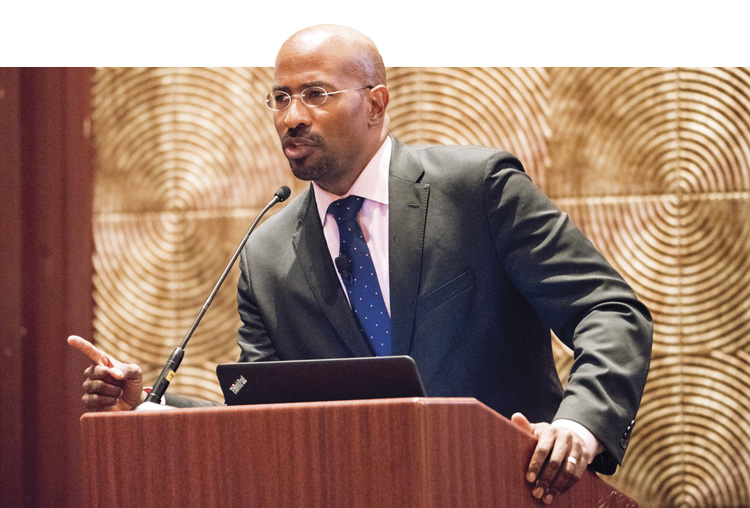How one Mississippi city reformed its bail and court fees policy

Van Jones was the moderator of the ABA Annual Meeting program "Just Debt: Reimagining Fines and Fees in America." Photo by Len Irish.
Jeffery Robinson, deputy legal director of the American Civil Liberties Union, thinks it’s possible for cities to reduce their dependence on fees and fines that have an unfair impact on people who are unable to pay.
He points to an ACLU settlement with one city as proof. “If Biloxi, Mississippi, can figure out a way not to jail people for fines and fees, and to have a fair bail system, do you really think that other cities in America can’t?” he asked during the program “Just Debt: Reimagining Fines and Fees in America.”
Biloxi officials agreed to hire a full-time public defender to assist those charged with nonpayment of fees and fines imposed by courts. People who enter payment plans or perform community service no longer will be charged additional fees. Judges will receive bench cards with steps to follow to conduct individualized assessments of ability to pay.
The National Task Force on Fines, Fees and Bail Practices developed a similar bench card, and it has published its resources for courts on the National Center for State Courts website. The card tells judges that they shouldn’t jail defendants for failing to pay court-ordered fees and fines unless a hearing is held to determine the reason for nonpayment. If the defendant can’t afford to pay, judges are instructed to consider alternatives to imprisonment.
At the program, moderated by CNN commentator Van Jones and sponsored by the ABA Center for Innovation and the ABA Journal, speakers discussed how people of moderate means are caught up in a cycle of debt when they are assessed fines as punishment, along with fees for the costs of using the court system. In some jurisdictions, there are booking fees, prison room-and-board fees and fees for using a public defender.
One alternative to imprisonment being explored in a pilot program by the NCSC has defendants take an online course about the possible consequences of their actions rather than paying a fine for speeding or driving distracted. Defendants will be followed to see whether repeat offenses occur.
This article appeared in the October 2017 issue of the ABA Journal with the headline “How Biloxi Reformed Bail, Court Fees Policy"




